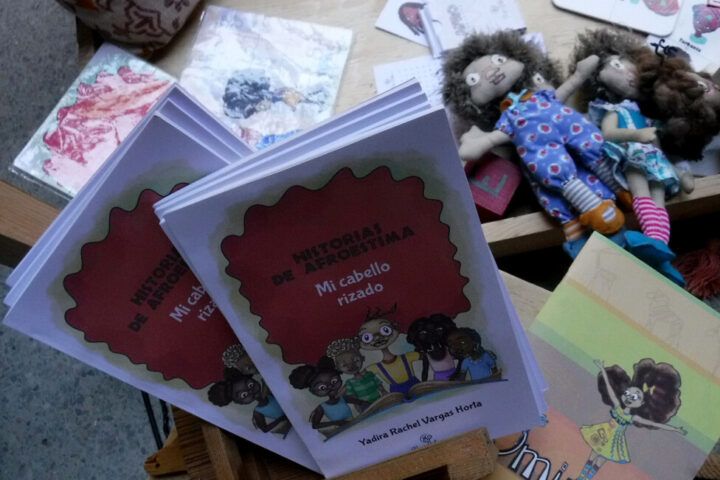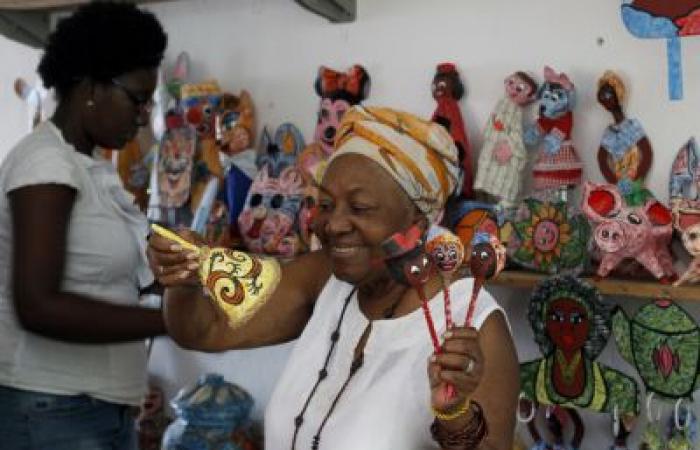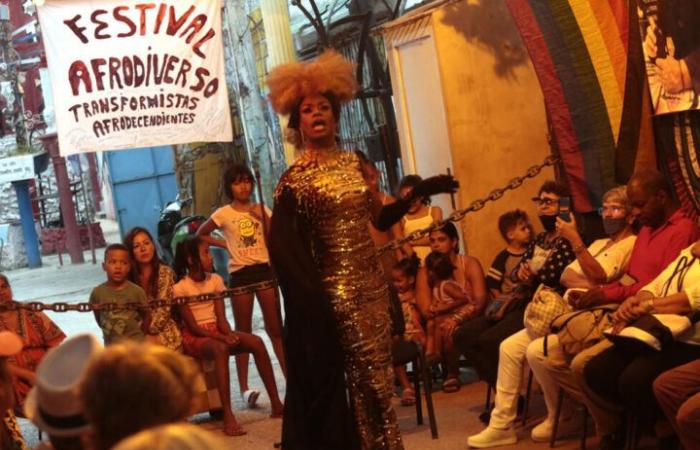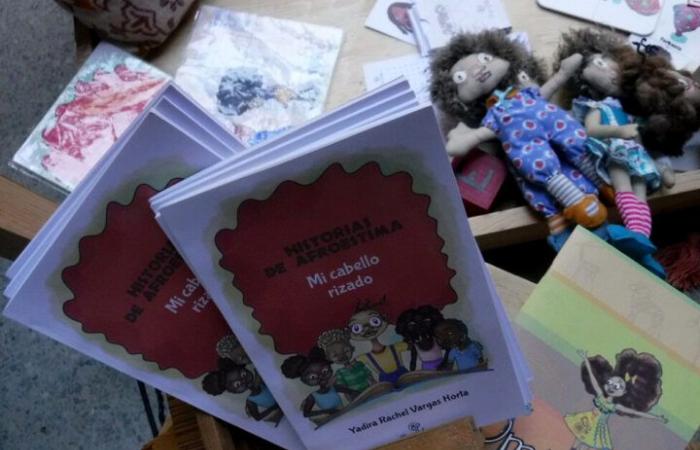The sculptor and cultural promoter Margarita Montalvo shows some crafts made at La Muñeca Negra, a community project that she founded in the Havana municipality of La Lisa and whose work emphasizes Afro-descendant women and the defense of their identity and culture in Cuba. Image: Jorge Luis Baños / IPS
IPS Cuba
HAVANA – Through activism, work in communities, through economic ventures or from academies, black and mestizo women have contributed significantly to channeling the agendas of the fight against racism and racial discrimination in Cuba.
Several of them maintain that, almost at the end of the International Decade for People of African Descent, proclaimed by the United Nations General Assembly for the period 2015-2024, contributions are being verified, although they will also remain pending on the Afrofeminist agenda related to inequality gaps. reluctant to disappear.
According to sociologist Geydis Fundora, it cannot be ignored that the promotion of the anti-racist agenda in this Caribbean country “has been a work of groups, also in alliance with men, but where women have played a prominent role.”
Entrepreneurs Deyni Terry (R) and Yurena Manfugás, founders of the BarbarA´s Power project, the first Cuban brand of Afro clothing based in Havana. In recent years, projects and ventures have emerged in Cuba around Afro-aesthetics, many led by women, which also recognizes the cultural, historical and aesthetic legacies of Afro-descendants. Image: Jorge Luis Baños / IPS
Recognition, justice and development
Regarding the three fundamental axes that drive the agenda of the Decade, recognition, justice and development, “I believe that there are contributions in all three,” the researcher and professor at the Latin American Faculty for Social Sciences (Flacso), specialized in issues, emphasized to IPS. of social inequalities and equity policies.
In the case of recognition, “I believe that women have been key in the recovery of the historical and cultural legacy of people of African descent, from popular education at the neighborhood level, community projects, to those who teach classes at various levels of education,” he considered. Founder.
She also referred to the movement around Afro-aesthetics, “with projects and ventures led by women, something that is also part of the recognition of that legacy.”
“Women have been key in the recovery of the historical and cultural legacy of Afro-descendants, from popular education at the neighborhood level, community projects, to those who teach classes at various levels of education”: Geydis Fundora.
In the area of development, she valued “the processes of training, capacity building, support for employment management, empowerment and creation of female Afro-entrepreneurships.”
For psychologist Norma Guillard, in the area of justice, the Program for the Advancement of Women and the National Program to Combat Racism and Racial Discrimination, among others, stand out in the Cuban case.
Since March 2021, the National Program for the Advancement of Women became the main public policy of the Cuban State to project other policies in favor of gender equality.
Previously, in November 2019, the government approved the National Program against Racism and Racial Discrimination, named Color cubano. It was conceived as a public policy to overcome disadvantages associated with skin color and proposes to act on the causes of racism in a multidimensional manner and from a comprehensive affirmative approach.
“I consider the strengthening of the legislative framework to prevent and confront various forms of discrimination, including those related to skin color, to be significant,” Guillard, president of the Identities, Diversity and Social Communication (Seres) section of the Cuban Psychological Society, told IPS.
The founder in 2012 of the Cuban chapter of the Regional Articulation of Afro-descendants of Latin America and the Caribbean, a civil society organization in the region, pointed out as an important element “the identification of public policies to address situations of vulnerability,” with a overrepresentation of black and mixed-race people.
Guillard highlighted the emergence in 2022, in Havana, of the Cuban Afrofeminist Articulation project, made up of academics, teachers, activists and artists “that connects all the projects that address black feminism and the confrontation with patriarchy and machismo.”
A drag artist performs during the celebration in Havana, in February and March 2023, of the first festival of Afro-descendant drag queens, a pioneering experience in Cuba. It was organized by the cultural and socio-community project Afrodiverso, one of the projects that focuses its work on the empowerment of black and mixed-race people from the LGBTIQ+ community, who are often made invisible. Image: Jorge Luis Baños / IPS
Statistics
The Cuban Constitution recognizes the equality of all people before the law and outlaws any type of discrimination harmful to human dignity, including that related to skin color.
Around 35% of the 11 million inhabitants of this Caribbean island country recognize themselves as mixed-race or black people, according to the 2012 Population and Housing Census.
Although the 1959 revolution adopted public policies and social transformations related to equal opportunities and equity, prejudices associated with skin color persist, often imperceptible. In recent years, some discriminatory acts have come to light, as well as job advertisements in the private sector.
Black and mixed-race people are underrepresented in self-employment, in the management of small and medium-sized businesses and in advantageous state work spaces, according to research that analyzes inequalities associated with skin color in employment in Cuba.
In contrast, this social group is over-represented in unskilled elementary occupations, with impacts on personal and family income. In this sense, they face greater difficulties with regard to the shortage of offers and high prices of food and basic necessities in a context of aggravated economic crisis.
Black and mixed-race women predominate in informal work. Due to the sexual division of labour, many of them remain outside the labour market, dedicating themselves exclusively to unpaid care work.
A diagnosis by Flacso Cuba in 2024 with black and mixed-race women from Havana reflected that 82.6% are affected by environmental problems in their municipality such as micro-dumps, leaks and noise pollution.
Nearly 50% of the women surveyed said that food shortages, environmental pollution and poor housing conditions are problems that affect them differently than men.
In the study, 76.8% of racialized women (people located in a racial category) considered that they can contribute human talent to local development processes, 23.3% material and historical resources, 21.7% natural resources and 18 .8% financial resources.
However, many are not called to participate in these processes, since they are perceived more as beneficiaries of policies than as architects in the design and implementation processes.

Copies of the book Stories of Afroesteem: My Curly Hair, by the historian and entrepreneur Yadira Rachel Vargas, exhibited during the Entrepreneurship Fair of the CubaEmprende project, in Havana. In 2022, Vargas founded Rizo Libre, a cultural and educational action venture focused on afroaesthetics. Image: Jorge Luis Baños / IPS
From the community
Several projects that focus on the Afro-descendant population prioritize a gender approach and the empowerment of LGBTIQ+ people (lesbian, gay, bisexual, trans, intersex and queer), who are often made invisible and victims of various forms of discrimination.
“We support bisexual and transgender women for their inclusion in society. Some joined the study, others opted for employment as an alternative; They come out of situations of violence and turn to transformism as a work platform,” Argelia Fellove, founder and leader of the Afrodiverso socio-community project, explained to IPS.
Based in the Cuban capital, “we are an itinerant, Afrofeminist project with the fundamental objective of visualizing the rights and empowering black Lgbtiq+ people,” recalled Fellove, who for more than a decade has stood out for the exercise of male transformism as a tool. to break down stereotypes.
In February and March 2023, Afrodiverso organized, with the support of other government and civil entities, the first festival of Afro-descendant drag queens, a pioneering experience in Cuba.
“We also develop cultural and health workshops and discussions based on popular education; we provide knowledge and alternatives to bring out the potential of girls, adolescents and women in vulnerable communities,” added Fellove.
Assessing the impact of anti-racist work in neighborhoods, historian Yadira Rachel Vargas commented that “when doing community work, I feel that people take it as a momentary activity that will not go beyond the exercise in time to solve a specific problem.”
For this reason, “we must work on communication, we must continue requesting spaces for dissemination, mainstreaming the information of these national and international agendas,” Vargas, manager of Rizo Libre, a cultural and educational action venture focused on afro-aesthetics, born in Havana in 2022.
At the end of January, Vargas presented the Cuba Collection: Games of Freedom, a kit of seven educational games to learn about, represent and have fun with the world of Afro/curly hair, aimed at children. It also includes the book Historias de Afroestima. Mi pelo curioso, the first children’s book published on the island about Afroesthetics.
In his opinion, the participation and appropriation of all these programs and objectives “involves socializing the results, communicating them in a correct way. I think that one of the main pending issues has to do with our work placing emphasis on providing the tools so that people feel subject to rights and know how to exercise them.”
Researchers insist that one Decade is insufficient to erase centuries of exclusion and that, in the face of new reconfigurations of racism, the fight for its eradication must be perfected.
“We have the challenge of continuing to strengthen people’s capacities in terms of knowledge of their rights, of the legal mechanisms to be able to process situations of violence and discrimination,” Fundora agreed.
Other challenges, he said, “are related to maternal mortality and its expression in skin color, life expectancy and healthy life expectancy, as well as adolescent fertility,” higher in black and mixed-race women.
To find solutions to such problems, “there is a space where we could work, but it requires the coordination of actors from science, government institutions, activism, community work, and where these women are protagonists,” said the researcher.








